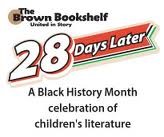 The Brown Bookshelf believes in promoting the work of Black children’s book creators year-round. At the same time, we shine a special spotlight on select authors and illustrators during the month of February, in honor of the traditional Black History Month observance inspired by the efforts of historian Carter G. Woodson, who strove to illuminate the vast history and myriad contributions of African Americans at a time when society was particularly resistant to such. We’re almost to the end, but still going strong!
The Brown Bookshelf believes in promoting the work of Black children’s book creators year-round. At the same time, we shine a special spotlight on select authors and illustrators during the month of February, in honor of the traditional Black History Month observance inspired by the efforts of historian Carter G. Woodson, who strove to illuminate the vast history and myriad contributions of African Americans at a time when society was particularly resistant to such. We’re almost to the end, but still going strong!
Fun fact, I met Shakirah on a maxi taxi in Trinidad a few years ago when the folks from Bocas Lit Fest brought me down for the annual Caribbean Literature Festival. We were on our way to a cocktail party where the winners of the Burt Award, for books for young adult literature. She was a finalist. We were well dressed, there was a signature cocktail, and we hit it off. So it’s my pleasure to introduce her to you here. Enjoy!
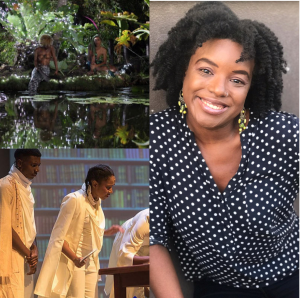 Tracey: How did you decide to start writing?
Tracey: How did you decide to start writing?
Shakirah: It all started with a love for reading. I didn’t come from a family of readers so when I discovered the library, my mind exploded. I consumed all the books in the children’s section in record time and became impatient waiting for the librarian to acquire more titles. I decided to start writing my own stories. At ten years old I created what I later realized was Sweet Valley High fan fiction, complete with cheerleaders, love triangles and murder.
I was born and raised in Barbados, a small Caribbean island, so the idea of having a career as a full-time author was almost laughable. Most parents and teachers pushed kids towards the holy trinity of professions–doctor, lawyer, or bank manager–so I thought of writing as a hobby at best. I studied Business and Marketing, trying to ignore my growing dislike for the subjects, and in my spare time I explored short fiction writing and screenwriting. I landed a job right out of university, with decent pay for an entry level uni student but consumed so much of my time that I had none to spare for writing.
I became absolutely miserable, and after witnessing me burse into tears when my vacation was coming to an end, my mother hinted that maybe it wasn’t the best working environment for me. After only a year, I decided to quit my job to become a full-time writer, and man, that was such a bad idea. I had no plan; no idea what I was going to write or how I would make money. I had severe writer’s block from the anxiety of it all, and tried to compensate by getting more involved in the local arts community.
I attempted to put writing behind me, deciding that I would be more useful to the creative sector by pursuing a Masters in Arts and Cultural Management in Scotland, since most artists needed business and marketing support. I enjoyed the programme but writing beckoned to me again, and despite restrictions from my scholarship, I secretly enrolled in screenwriting evening classes at another university. Yes, I snuck out of school to study movie structure.
I fully intended to continue along the arts business path on returning home, but there were no jobs available in my field, so I fell into freelance writing; doing magazine feature writing and communication projects and exploring other forms of writing. It was a winding path that I tried to escape, but I returned to Barbados in 2012, and by 2016 I had written four indie films, a musical, a play and self-published a collection of short stories and a creative non-fiction anthology. I made a lot of mistakes but I don’t regret anything at all.
Tracey: Um, that was traumatizing to read. I’m just going to let all the Caribbean folks enjoy that “burse into tears” phrase, and assume that the non-Caribbeans will get it. Okay, so mistakes aplenty. How did you actually become published?
Shakirah: This was another circuitous journey–is the road ever straight? Up to 2016 I had never completed a novel. It seemed like too many words! And though several of my short stories were written from a child’s POV, I had never created a story for children.
Then I became aware of the CODE/Burt Award for Caribbean Young Adult Literature competition. The entry had to be a minimum of 20,000 words and the award came with a cash prize, a regional publishing deal and guaranteed purchase of 2000 books to be distributed to libraries and schools. This was a one-of-a-kind, amazing opportunity that I could not pass up. I edited and submitted a story wasting away in my archives, but to my disappointment, it I wasn’t shortlisted.
A few months later, 24 days before the new deadline for BURT in 2017, I read a fantastic blog post from author Joanne C. Hilhouse, who revealed that she wrote her winning title for the same competition in less than two weeks! Since I had almost double that time, I challenged myself to write a new book to submit. It was a whirlwind and I did nothing but write, eat and sometimes sleep for three weeks, but I made the deadline.
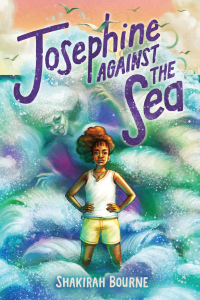 JOSEPHINE AGAINST THE SEA (then called MY FISHY STEPMOM) was an idea that lurked at the back of my head for a long time, and was my first attempt to write a fantastical story which combined my fascination with Caribbean mythology and my love for adventure. I didn’t expect it to be shortlisted for the BURT Award, so instead of waiting for the inevitable bad news, I googled “How to get a literary agent” and that opened the doors to the world of query letters, pitch competitions and MSWL. This is a long story that I actually blog about on my website, but to summarize, I started querying in December, found out I was shortlisted for the BURT competition in March, and signed with my agent in April 2018. I still can’t believe everything that happened in those few months. My life changed completely. Suddenly I was a kidlit writer, and wondering why it took me so long to realize it was always my passion.
JOSEPHINE AGAINST THE SEA (then called MY FISHY STEPMOM) was an idea that lurked at the back of my head for a long time, and was my first attempt to write a fantastical story which combined my fascination with Caribbean mythology and my love for adventure. I didn’t expect it to be shortlisted for the BURT Award, so instead of waiting for the inevitable bad news, I googled “How to get a literary agent” and that opened the doors to the world of query letters, pitch competitions and MSWL. This is a long story that I actually blog about on my website, but to summarize, I started querying in December, found out I was shortlisted for the BURT competition in March, and signed with my agent in April 2018. I still can’t believe everything that happened in those few months. My life changed completely. Suddenly I was a kidlit writer, and wondering why it took me so long to realize it was always my passion.
I spent some time doing edits with my agent and my Caribbean editor, and then went out on submission to US editors in October 2018. The painful rejections trickled in until we got an R&R request from Mallory Kass at Scholastic in January 2019. We had a call and Mallory was just fantastic and I wanted to work with her so badly. I undertook those revisions like I was studying for the 11+ Exam or SATs, and she made an offer in June 2019! JOSEPHINE AGAINST THE SEA comes out July 6th 2021 and I am counting down the days.
Tracey: When I met Shakirah the book still had the original title, which I LOVED! So, with all the craziness of entering this world, who or what inspires you to keep going?
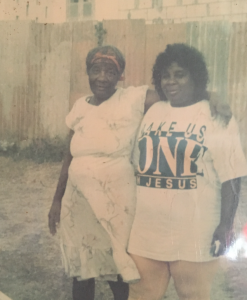 Shakirah: My island; I’m so proud of my little rock–it’s so full of life, colorful characters and talented people. I inhaled so many books in the library as a kid, and at the time none of them had any black, much less Caribbean characters or landscapes. I think about books that I wish I could have read when I was younger and stuff my own work with Bajan dialect, customs, mythology and setting.
Shakirah: My island; I’m so proud of my little rock–it’s so full of life, colorful characters and talented people. I inhaled so many books in the library as a kid, and at the time none of them had any black, much less Caribbean characters or landscapes. I think about books that I wish I could have read when I was younger and stuff my own work with Bajan dialect, customs, mythology and setting.
I’m still an avid reader, and I consistently get inspired by other books–in all genres and age categories since I believe we can learn something from all texts, even those we may not enjoy. I’m always imagining how a particular story may play out if it happened in a Caribbean setting. It’s a pain to watch movies with me since I’m constantly pausing the films to jot down some idea sparked from a scene, or a line of dialogue.
My family and friends inspire me to keep going. Even when I want to give up, I remember how much they believe in me and sacrificed so that I had the privilege of time to write, and have supported me throughout the years. I earlier mentioned that I didn’t come from a family of readers but my great grandmother and grandmother, both now deceased, were brilliant oral storytellers, and when I think about them spinning their tales, even while experiencing hardship, I keep pushing.
Tracey: We definitely have oral tradition going strong in the Caribbean still. Please tell us a little about how you work.
Shakirah: I do most of my writing early in the morning before the world wakes up. I spend a lot of time staring out of the window, listening to birds, crickets, dogs barking, any natural noise. I still can’t write with music in the background. The song lyrics disturb my imagination, and I’d find myself singing or dancing along to the songs. I’d even hum to classical music and then get distracted by my own humming. I really wish I could write and listen to music–it seems like fun. Sometimes I talk out loud as I type, but that’s not the same.
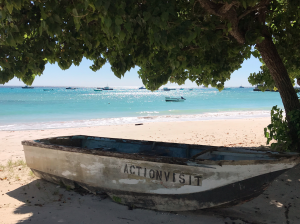 Sometimes if I’m feeling cooped up inside, I’d drive down to the beach and write until my laptop dies. I do find the sound of the sea very soothing, even if it’s interrupted by an argument breaking out over a nearby game of dominoes. I am not good with writing on paper at all. My mind moves faster than my fingers and then I have to spend hours trying to decipher my own handwriting.
Sometimes if I’m feeling cooped up inside, I’d drive down to the beach and write until my laptop dies. I do find the sound of the sea very soothing, even if it’s interrupted by an argument breaking out over a nearby game of dominoes. I am not good with writing on paper at all. My mind moves faster than my fingers and then I have to spend hours trying to decipher my own handwriting.
Because I lose all papers, I created an “idea email address” and I’d send random ideas for characters, stories, plots, lines of dialogue, scenes, everything. If I feeling stuck or looking for motivation, I’d log in and read a couple emails for inspiration.
I am a planster. I cannot start writing without some kind of outline, and I meticulously plan out the story, all while knowing that when I actually start writing, it most likely will take an unexpected turn. I just need to know where I’m going, even if I take a few detours. I also self-edit. I cannot help it. I would never advise the technique to other writers, but I find re-reading a previous chapter before I start to write helps to immerse myself into the world and continue the story. I truly hope one day I’ll be one of those writers who can fast draft and be totally okay with messy drafts, but for now this process works for me.
Tracey: Plotter + Pantser = Plantser. We get it. Alright, it’s bragging time.
Shakirah: It’s still early days and ARCs will soon be available, but the one and only Tracey Baptiste (The Jumbies) had this to say about my book!
“I cannot express how much I loved Josephine Against the Sea. Jo is a funny, determined heroine with no end of schemes, the Caribbean setting and cast of characters will be delightfully familiar to every islander, and Bourne’s masterful modernizing of jumbie lore is thrilling. The story is riveting from beginning to end. You will not be disappointed.”
The Burt Judges also stated that it is “A delightful story that is charmingly funny. With a folktale antagonist, the shenanigans that result as the main character fights to preserve her bonds of family and friendship are heartwarming.”
JOSEPHINE AGAINST THE SEA is available for pre-order here.
Tracey: I meant every word. Finally, what do you think of the industry as regards Black creators of books for children?
Shakirah: Growing up, I rarely (if ever) saw Black people in the children’s books I consumed. I truly appreciate the Caribbean novels on the syllabuses in secondary school (most of the same books remain on that syllabus today) but most of these novels were very literary, and I perceived them as “boring school work”, though I later formed a greater appreciation for those books.
Now, thanks to initiatives like We Need Diverse Books and the #ownvoices movement, programmes like Burt Award in Africa, the Caribbean and First Nations, Inuit and Métis communities in Canada, along with the rise of self-publishing, there are more middle grade and young adult options with better representation, but the statistics show the vast amount of books published is overwhelmingly white.
We need more books by Black authors. We need more Black Authors. We need More.
As much as everyone repeats that black people are not a monolith, I find that stories revolving around Black pain and trauma are amplified by certain gatekeepers, and held in high literary esteem, and while these are important stories to be told, tales of Black joy, Black children having fun and going on adventures, saving the world or navigating friendship and love deserve the same support and visibility. There are so many different cultures, religions, language and dialects–a colossal of Black experiences still waiting to be highlighted, not only African American experiences, but those from the African continent, the Caribbean and Latin America.
And the few Black authors who happen to get attention find themselves in the awkward position of having to satisfy the expectations of readers desperate to see representation, and feel pressured from the sudden responsibility of representing numerous communities and narratives in a single book.
I hope one day, that books which reflect the wide scope of the Black experience will flood the market, and people will have the freedom to read those books without the weight of expectation, and enjoy the luxury of accepting a story for what it is, not what they hope it will be.
You can find more on Shakirah and her debut novel at the links below.
Website: www.shakirahbourne.com
Twitter & Instagram: @shakirahwrites
Goodreads: https://www.goodreads.com/book/show/52497242-josephine-against-the-sea
